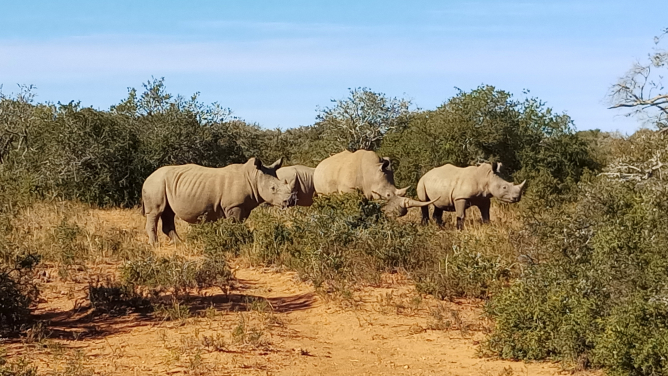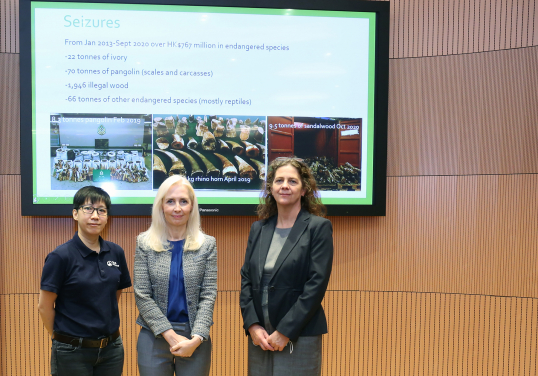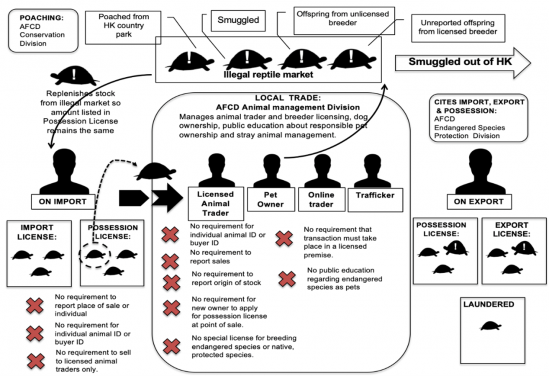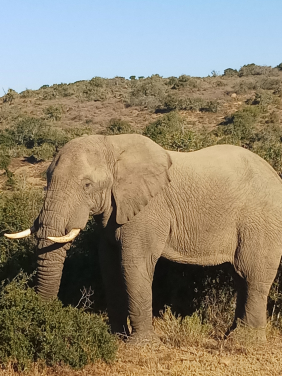Media
HKU law professor releases report on wildlife trade in Hong Kong and recommendations on legislative changes to combat illegal activities
23 Oct 2020

Approximately 67 rhinos, 3,000 elephants and over 138,000 pangolins are estimated to be slaugtered from the amount of seizures made by the HKSAR government in trafficked wildlife totalling over HK$767 million between 2013 and 2019. (photo credit for the pangolins: Kadoorie Farm and Botanic Garden, other photos: Amanda Whitfort)

Approximately 67 rhinos are estimated to be killed from the amount of seizures made by the HKSAR government in trafficked wildlife between 2012 and 2019. (photo credit: Amanda Whitfort)
Unsustainable and illegal trade in wildlife threatens endangered and vulnerable species. The legislation and policies adopted by the Hong Kong government on both legal and illegal trade have significant impact on endangered species globally.
Hong Kong is a wildlife trading hub. In 2018, Hong Kong SAR reported in the Convention on Trade in Endangered Species (CITES) Trade Database the import of over 350 CITES listed species from 36 territories, in over 40 different forms, ranging from live animals to whole skins and finished carvings.
Half of rhino horn and tiger bone smuggling cases in China came through Hong Kong
In addition, reported wildlife smuggling cases prosecuted in Mainland China between 2014 and 2018 show that, in 50% of cases involving the smuggling of rhino horn and tiger bone, the contraband entered the Mainland via Hong Kong.
Wildlife offences need to be recognised as serious and organised under HK law
In order to effectively deter increasing levels of wildlife smuggling through Hong Kong, wildlife offences should be recognised as serious criminal offences under the Organised and Serious Crimes Ordinance, Cap 455. In addition, greater efforts should be made to combat the laundering of illegally caught animals through Hong Kong’s legal trade and improved traceability measures should be adopted to monitor the movement of live-traded animals.
Commencing in 2017, Associate Professor Amanda Whitfort of the Faculty of Law and Dr Fiona Woodhouse, Deputy Director (Welfare) of the Society for the Prevention of Cruelty to Animals (HK), with the support of GRF Grant (No 17655316) provided by the University Grants Committee of Hong Kong, undertook a two year study of the effectiveness of Hong Kong’s laws and policies controlling trade in endangered and threatened species of animals. During the course of the study, 12 stakeholders representing government, academia, NGOs and the trade were interviewed about the effectiveness of the current framework. All agreed that the increasing volume of both legal trade and illegal smuggling of wildlife has made the current legislation difficult to enforce.
The reviewers compared Hong Kong’s current legislation and policy on importing and possessing wildlife with the best practice in the EU, USA and Australia and made 38 recommendations to improve the enforcement and impact of Hong Kong’s laws and policies to control legal and illegal trade in endangered and vulnerable species. These include amending the Organised and Serious Crimes Ordinance to include wildlife crimes, identifying trades that are particularly vulnerable to the laundering of endangered species, developing specific action plans to combat offending and imposing strict identification controls to ensure the traceability through the supply chain of all live-traded animals.
Amendment of Cap. 586 was important but not sufficiently deterrent
In mid-2018, the Protection of Endangered Species of Animals and Plants Ordinance was amended to permit wildlife crimes to be prosecuted as indictable offences. However, wildlife crimes have yet to be regarded as serious crimes under the Organised and Serious Crimes Ordinance, despite multi-million-dollar (USD) wildlife smuggling seizures being recorded in the Territory.
Between 2013 and 2019, seizures made by the Customs and Excise Department represented over HK$767 million in trafficked wildlife, including 22 metric tonnes of ivory (requiring the slaughter of approximately 3,000 elephants), 70 metric tonnes of pangolin (the scales and carcasses of which are estimated to have involved the killing of over 138,000 pangolins) and 66 metric tonnes of other endangered species (mainly reptiles).
Despite increase in seizure volumes and values over the past decade, there has been no prosecution of wildlife smuggling networks in Hong Kong
Smuggling is a transnational activity, often involving well-resourced groups. However, despite the high value and volume of seizures, there is no specialised investigative team nor sufficiently robust legislation to investigate and prosecute such networks. The detection of seizures, though important, can be regarded as an indicator of the volume of illegal trade passing through Hong Kong, rather than a measure of success at limiting the trade.
Despite Hong Kong’s increasingly large-scale seizures, particularly from shipping containers, no wildlife traffickers have ever been prosecuted for money laundering related offences and no syndicates indicted for wildlife smuggling. This is the direct result of the Hong Kong government’s continuing failure to recognise wildlife crimes as specified offences under the Organised and Serious Crimes Ordinance. Recognising wildlife crimes as serious crimes, like other trafficking offences, under the Organised and Serious Crimes Ordinance, would unleash the full force of investigative powers necessary to effectively combat Hong Kong’s increasingly serious wildlife trafficking problem. The study’s primary recommendation is therefore to amend the Organised and Serious Crimes Ordinance, Cap 455, to include serious wildlife crimes as specified offences.
Identifying trades at high risk for laundering
The study revealed significant concern that Hong Kong’s legal trade is being used for illegal activity. This has resulted from extremely limited traceability in the supply chain for most endangered species. Highly endangered species enter Hong Kong illegally in two ways: smuggling or laundering.
Smuggling
Hong Kong is a well-known smuggling hub for highly endangered and costly reptile pet species. Species without permits for entry are frequently discovered secreted inside luggage on airplanes, in the back of cross border trucks and in the holds of boats entering Hong Kong waters. Along with the obvious and serious animal welfare concerns associated with the smuggling of live animals, evasion of quarantine controls puts Hong Kong people and animals at risk of zoonotic disease outbreaks.
Laundering
Where the imports of animals are declared, endangered and illegally smuggled species are often mixed together with legal species to evade identification by law enforcement authorities.
Hong Kong imports up to a million reptiles annually for food and the pet trade, but the volume and current system make it impossible to determine how many of these animals are sold, consumed, abandoned or die in the trade. Once species have entered Hong Kong, loopholes in the current control regimes allow for easy laundering of animals through licensed traders. These loopholes result from the loosening of government requirements for possession licences in 2006 which have resulted in the numbers of applications for import licenses and possession licenses dropping by almost 90%, in 15 years. With import permits for controlled species now based on individual consignments, or keeping premises, import permits are no longer required for individual animals and the laundering of smuggled species has become much easier for criminals.
Improving traceability of live traded species
In the absence of individual possession licences which would help to identify individual animals, unscrupulous traders can claim wild-caught reptiles, birds and fish are the result of captive breeding or replace legally imported animals with those procured illegally, in breach of Hong Kong’s efforts to enforce the Convention on International Trade in Endangered Species (CITES).
The AFCD has previously done extensive studies to evaluate traceability in the dog trade and the ivory trade, subsequently closing loopholes that had enabled widespread laundering in both trades.
The reviewers suggest that traceability in the endangered species trade be similarly studied, so that all sales of controlled animals in Hong Kong can be traced back to a verifiable legal source for public health, conservation and welfare protection. In 2016, AFCD’s Animal Management Division rectified similar problems in the dog trade by amending Cap 139B Public Health (Animals and Birds) (Trading and Breeding) to require the origin and transfer of all imports, breeding and sales to be documented by traders. Similar controls should be put on the sale of live endangered species.
For the full report, please click here.
For media enquiries, please contact:
Amanda Whitfort, Associate Professor, Faculty of Law, HKU (Email: [email protected])
Melanie Wan, Senior Manager (Media), Communications and Public Affairs Office, HKU (Tel: 2859 2600 / Email: [email protected])



